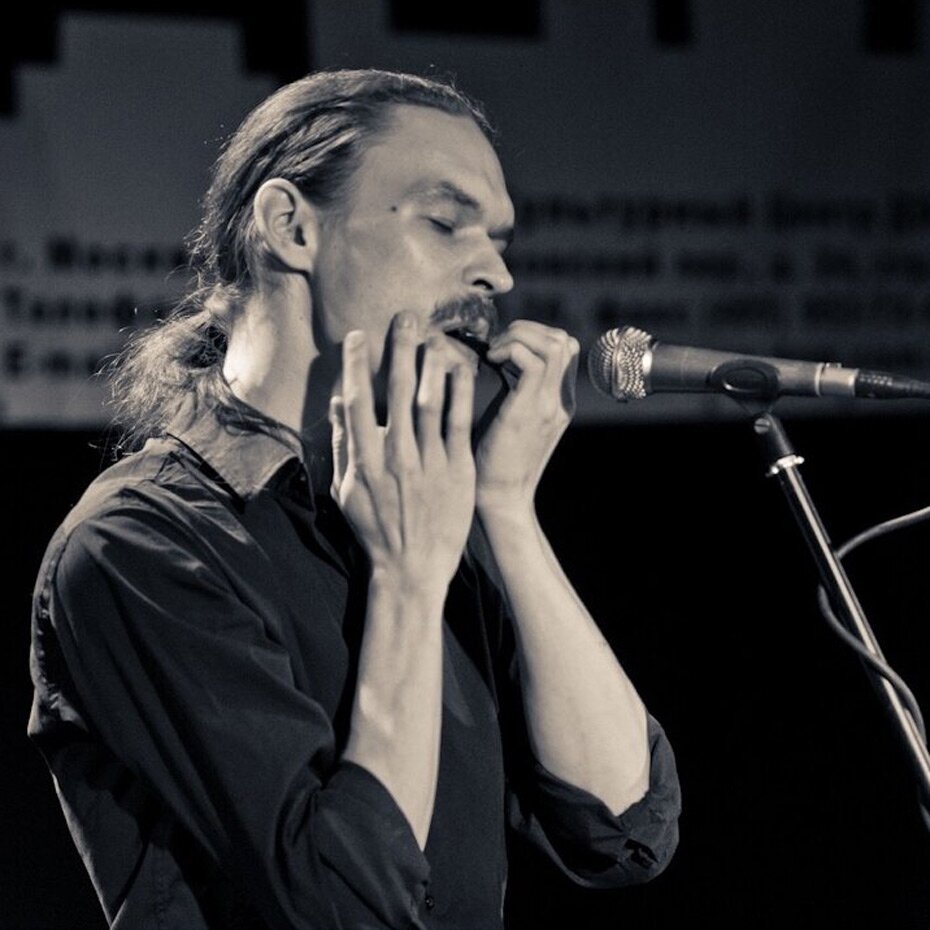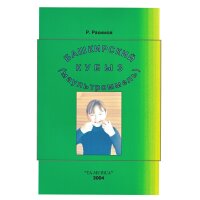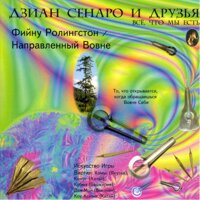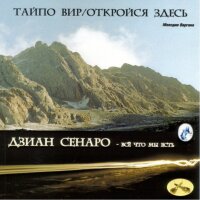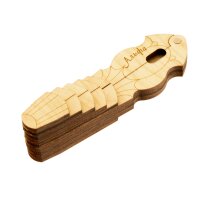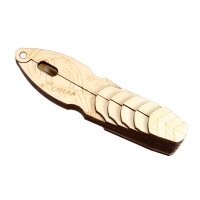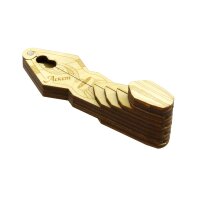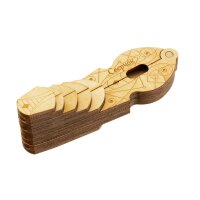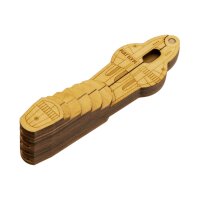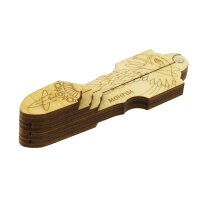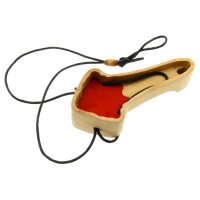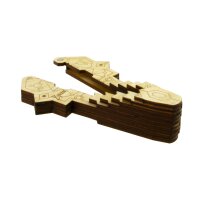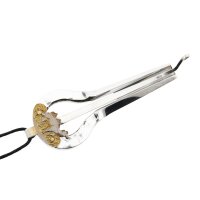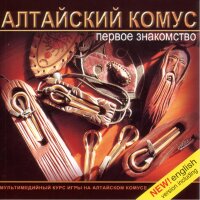30 year old Aksenty Beskrovny from Moscow is already one of the most important experts representing the jaw harp to the public not only as musicians but also as scientists. When he discovered the jaw harp for himself in the age of 18, he decided to wholeheartedly focus on this instrument. Since then he has been studying it with his whole attention and living on his activities as a jaw harp virtuoso. He plays solo concerts, cooperates with international musicians, and he gives lectures and runs workshops. Aksenty adds new features of sound to the Russian jaw harp technique. And thereby he also draws attention to the mouth harp in Western Russia.
Letters to Aksenty
In some areas of the Russian Federation jaw harp music is officially acknowledged and even fostered, such as in Yakutia (Sakha), in the Altai region, in the Republics of Tuva and Bashkortostan. Research, classes at music schools and concerts add to the lively interaction with the instrument. In the areas of Russia less touched by the mouth harp the scene organizes itself. Such as in Moscow – where for several years single enthusiasts have been trying to achieve more public acknowledgement for the jaw harp and to remind of its historical roots.
To find out more about the Russian Vargan, I wrote directly to Aksenty Beskrovny and asked him to tell me about his life as a professional jaw harp player in Moscow. We conversed via a number of emails in which he described his approach to the jaw harp playing. I wanted to understand his personal appreciation of this instrument which seemed to be far from any specific regional tradition.
"Книга призвуков" – The book of overtones
At first I listened to a few of Aksenty’s latest pieces on his website aksenty.ru. The single recordings belong to the constantly updated web album "Книга призвуков" which could be liberally translated as “book of overtones”. The tracks are called “improvisations”. For each track Aksenty plays a jaw harp with a different keynote. These mouth harps are made by the smith Sergei Pyzhov. Aksenty writes that he has tried out a few thousand different jaw harps from all over the world in the past years. “There have been a few really good models among them. But since 2012 I have only been playing instruments made by Sergei Pyzhov. Some of his models seem to be made just for me. With them I enjoy music the most.”

Russian vargan from Sergey Pyzhov
One can hear it on the recordings: the melodies and florid passages swing with precise contours, they float dynamically and rich in resonance. The “book of overtones” is a study of jaw harp music centering on melody. In parts it reminds of the Norwegian jaw harp tradition, but with less strokes. Aksenty uses the swinging of the mouth harp tongue to produce several notes with only one stroke, and to integrate shades (overtones) and slides into the music.
Aksenty Beskrovny’s style of jaw harp playing is characterized clearly individually. But this musician is not only led by his own intuition, he also benefits from the exchange with other musicians. In one of our emails he wrote: “When I started playing there was hardly anybody in my area, in and around Moscow, who could have taught me. So I taught myself how to play the mouth harp. I improvised a lot and did not follow any certain tradition. I totally fell in love with this kind of music making, and until today I have mostly been playing my own improvisations. But a lot of experiences I also collected at jam sessions with other musicians. In the past years I have played music with hundreds of jaw harp players from all over the world. This has been an enormously important treasure of experience for me. Many of those people were part of a certain jaw harp tradition or played their very own jaw harp style. Through them I could always broaden my own concept of mouth harp playing.”
A life as professional jaw harp player
For about eleven years already Aksenty has devoted himself extensively to the jaw harp. When others attended university he chose an autodidactic study of the Vargan. He writes: “If you want to work as a professional jaw harp player you got to do everything by yourself: you have to finance your work by yourself, to organize your own projects, lectures and presentations, and you got to care about improving your playing technique.” Without doubt it is a huge challenge in a city like Moscow where the jaw harp is not really popular yet. But Aksenty does not regret his decision. “I understand these same daily challenges as very enriching.”
The reason for being fond of this of all instruments is, according to the improvisation artist himself, that the mouth harps differ profoundly from all other instruments. “The music is created in yourself, in your own body. While playing you literally transform yourself into an instrument. The sound changes with every move of your muscles. It is a wonderful process: you compose music, and at the same time you create a unique musical instrument with your body. The more you play the Vargan, the more your body interacts with the music. I like to be part of this very process and to feel like an explorer of my own skills.”
The jaw harp is immortal
His first tone on a jaw harp the Muscovite did not play on a Russian Vargan but on a mouth harp from Austria by Karl Schwarz. “I tried to play it and I even managed to coax a few sounds out of it. I liked it, and since then I haven’t stopped playing the jaw harp.” Since that day Aksenty Beskrovny has not just played the instrument but also studied it. “The jaw harp has an amazing history. In many countries it is connected to an own tradition, mostly it has even got a country-specific identity. Therefore the mouth harp traditions of two countries often differ totally from each other. These instruments have existed throughout all eras and all over the world. According to my opinion this is possible because the jaw harp does not only exist within a tradition but to some extent also outside of traditions. Local societies change, sometimes even become extinct, but this small simple mouth harp just can’t get lost. This is the reason why I am so interested in the history of these instruments. Sometimes I spend days in a library to discover a new detail.”

Aksenty Beskrovny is doing research on Russian Vargan
Even if he feels like a lone wolf at times, over the years a small Russian jaw harp scene has evolved. And this nurses Aksenty’s hope that the jaw harp in West Russia might experience a revival anytime soon – not least because of the continuing work of mouth harp enthusiasts like him. After all, such an upturn is said to have been successful a few times already, such as in Sakha where the jaw harp playing hardly played any role a few decades ago and where today it is supported and spread through many public activities. “Yakutia is a good example and a hope for all those who wish for a professional development of jaw harp traditions in other areas, too.”
